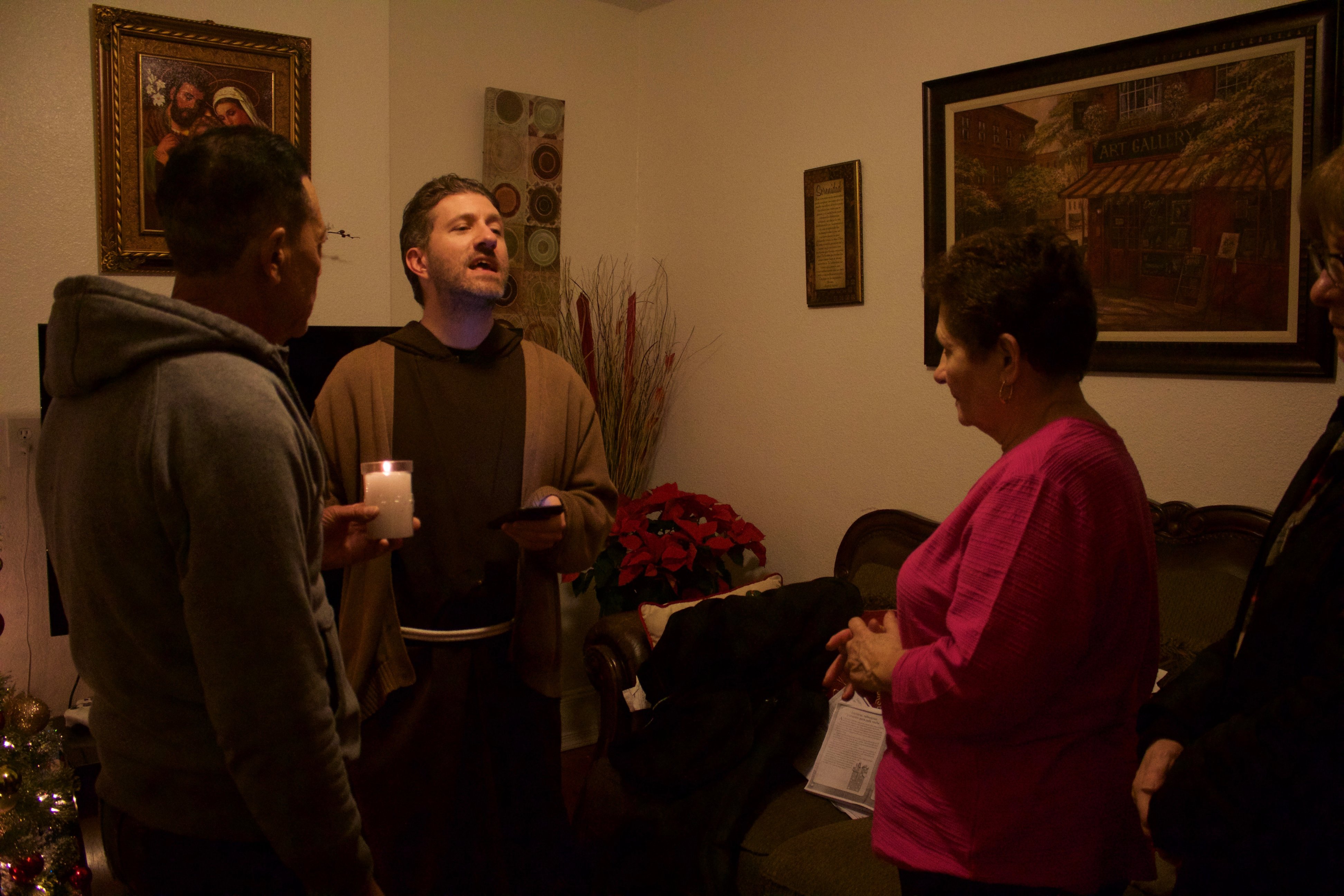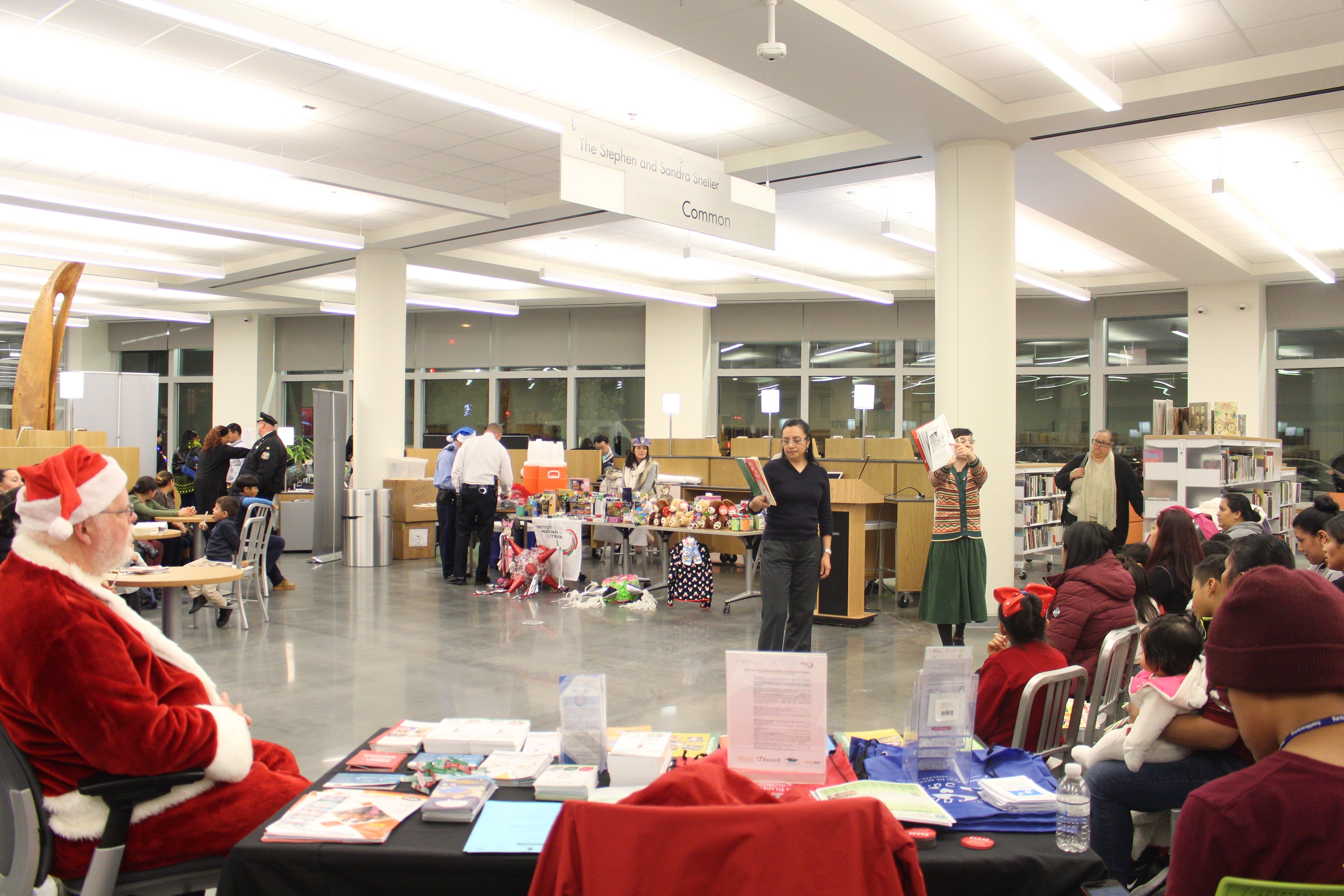
Las posadas in Philadelphia: A Christmas tradition celebrated anew
The story that is told through the posadas, the Christmas tradition practiced in countries throughout Latin America, has taken on a special relevance this year…
The group of 12 stood holding battery-powered candles, and bundled in coats, divided by a closed door. Several among them huddled in the entryway of the house in Frankford, and others stood inside the warm living room where a decorated Christmas tree reigned in the corner.
The setting was modern-day Philadelphia on a cold evening the week before Christmas, but the story the small gathering reenacted in that brief moment has been repeated for thousands of years.
No sean inhumanos
Dennos caridad
Que el dios de los cielos
Se lo premiará
[Don’t be inhumane
Show us charity
God of the heavens
Will reward you for it]
Outside the doorway, people sang the part of the weary travelers, Mary and Joseph. The group inside played the part of the innkeepers of Bethlehem who refuse the couple a room in their home, until they finally recognize Mary and Joseph as the Holy Family, who in the biblical narrative are awaiting the birth of Jesus, the son of God.
The celebrants in Kensington, led by Brother Andrew McCarty, a Capuchin Franciscan brother from the Padre Pio Center in Kensington, and Carmen Hernández, who also works with the Padre Pio Center, entered the house to share food as they said prayers, sang Christmas carols, and read stories of Jesus’ birth from the Bible.
Posadas navideñas have been a tradition for centuries in Latin America, consisting of processions and celebrations from Dec. 16 through Dec. 24, Christmas Eve. Though they are practiced mostly in Mexico and Central America, there are similar customs elsewhere under different names, such as parrandas in Puerto Rico and novenarios in Colombia, in which celebrants and community members process through the town streets, going from one house to the next until they rest and find posada in someone’s home, where all gather to eat tamales and other traditional Christmas dishes.
The atmosphere is festive, but the story that the posada - a word that means “inn,” or “lodge” in its everyday use - recounts is one of the desperate search for lodging that Mary and Joseph undertook on their journey before Jesus was born, according to the Bible. The couple had traveled from Nazareth to Bethlehem for the census count ordered by the Roman emperor and were turned away lodge after lodge, knocking on doors until they reached a house where the owner offered them space in his stable to rest.
It is a story of flight and of struggle, which resonates with many.
Commemorating this aspect of the Christmas story is made all the more poignant when viewed in the context of the many migrants and refugees who are traveling in search of shelter and security today.
“I think [the message of posadas] is as relevant today as it ever has been. Probably even more,” said Brother Andrew McCarty, who worked with Hernández and other community members to coordinate this year’s posadas. “And I think that, again, it’s part of our call in the Church to offer that posada, to offer that shelter, to offer that inn, that space - and sometimes its physical, but sometimes it is also emotional, or spiritual.”
These were the first posadas of their kind organized by the center since it was established in Kensington in Aug. 2017.

RELATED CONTENT
Hernández, for her part, said that though the message of the posadas connects to the situation of Central American immigrants who journey to the U.S.-Mexico border, the tradition is a reminder that ¨there have always been refugees, and there have most especially always been people who don’t have a home.”
“This is a moment to recognize that, like Mary and Joseph who were asking and were denied, there are many people who are experiencing this, including immigrants in this situation right now,” she noted.
Hernández, who in years past had participated in posadas in the neighborhood with the San Joaquín and Madre Dolorosa congregations before those churches were closed, said that practicing the tradition also presents a way of preserving her culture as a Puerto Rican, as well as other Latin American cultures, within the context of a religious celebration.
“It’s good that we can maintain the customs and traditions for the younger generations, so that they can know that even while living in this country, we are able to maintain our culture and the ways of expressing our culture in our religion,” she said.
For both Hernández and McCarty, the posadas held in Kensington are also a powerful way of bringing community members together, as visits to the homes of different members of their congregations allow for a more intimate way of connecting with one another.
This sense of cultivating ties among community members and stakeholders was also a central part of another Philly posada, more secular in its format, held Dec. 17 on the other side of the city at the South Philadelphia Free Library branch and organized by the library, the Mexican Consulate of Philadelphia and the Philadelphia Police Department´s Third district.
Library supervisor Renee Pokorny noted that the large turnout at this year’s third annual posada celebration was a testament to an effort to “integrate other holiday traditions and make it more inclusive.”

The gathering included a bilingual storytelling of “How the Grinch Stole Christmas,” followed by a gift-giving from “Santa Claus” and rounds of hot chocolate. Some families moved towards the doors of the library to split into the two groups and carry out the reenactment in Spanish of Mary and Joseph’s search for shelter, which celebrants would sing in Kensington days later.
Alicia G. Kerber-Palma, head of the Mexican Consulate in Philadelphia, told AL DÍA that the centuries-old tradition of the posadas also has a contemporary relevance due to its focus on “opening the door to those who don’t have anything.”
“I think in this moment that message is very valid, because we’ve seen that not just in the United States but in many parts of the world there are many refugees, or people requesting asylum,” said Kerber-Palma.
“At this time, what is better than to open the door to those who do not have anything?”











LEAVE A COMMENT:
Join the discussion! Leave a comment.